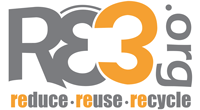Guest blogger – Clare
As many of you are aware, a statewide landfill disposal ban on plastic bottles goes into effect Oct. 1 of this year. Publicizing your program as an “all bottle” program is a very simple message that the public can remember, since it doesn’t involve looking at plastic resin numbers or remembering what specific plastics their community recycles. This begs the obvious question of why most local governments don’t adopt an “all bottles” recycling program and message.
If a recycling program’s overall goals are to expand public participation and to increase the amount of recycled materials, switching to an “all bottles” message is an excellent way to do that. Asking generators to “check the neck” is much easier than asking them to remember which resin numbers their community recycles and in what form. For example, many wide mouth containers have both a resin code and are made from PET or HDPE, despite the fact that they are not collected in many North Carolina communities. This adds to the confusion many residents already have about recycling and could increase contamination in the material stream. Even I’ve tossed a few plastic tubs in my bin resulting from a confusing education message from my town. With a simple, straightforward recycling message on plastics, residents can feel confident knowing that the plastic bottles they put in the bin can and will be recycled properly.
From this increase in consumer confidence, the amount of recycled materials is sure to expand. Even more so since most North Carolina curbside or drop-off programs collect mainly PET and HDPE and 95% of all plastic bottles are PET or HDPE (according to the American Plastics Council).
Several North Carolina communities already have an “all bottles” message. For example, since Watauga County switched to the “all bottles” message in 2008 it has seen a staggering 220% increase in plastics tonnage! Orange County has also had tremendous success in its “all bottles” messaging results.
To learn more about Watauga and Orange Counties’ “all bottles” strategies, as well as more information about switching to an “all bottles” campaign, please visit DPPEA’s site on “all bottles” best management practices here.

1 comment:
Nice post, Clare. Although Raleigh has taken all bottles since 2006, many residents still think it's only #1 and #2 bottles. It's really hard to get people to stop looking at the little numbers.
Post a Comment